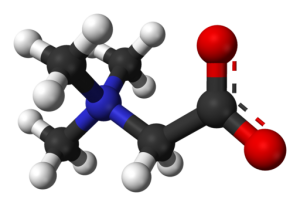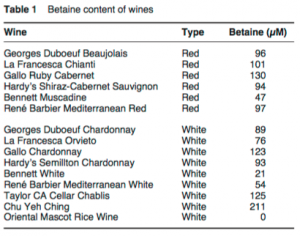Betaine may benefit only those whose workouts mean business.

- Facilitating synthesis of proteins. Your body needs its fix of proteins, and betaine has the methyl groups to make them.1
- Osmoregulation in cells. Betaine helps make sure your cells have the right amount of water, especially under the stress you’re about to put on them.2
Overview
Betaine — also known as trimethylglycine (TMG) — was first extracted from the juice of the sugar beet, though it was not until 1952 that it first landed on the radar of doctors and nutritionists. A team of doctors treating polio patients noticed that their betaine-containing treatment had a welcome side effect…their patients reported feeling an increase in strength and endurance.3
Betaine is found in many common foods, but concentrated significantly in beets, spinach, wheat foods, and shellfish.4 In addition, our own bodies can oxidize choline (an essential nutrient) to produce betaine.
Since betaine was first implicated as having potential ergogenic value, exercise scientists have been studying its effect on both animal and human bodies via a wide range of physiological experiments… but they’ve received mixed results. While the jury is still out, let’s explore what we know.
How Betaine Might Help PWO Formulas
Increased protein production
Betaine participates in a mitochondrial biochemical pathway called the methionine cycle. A byproduct of this cycle, called S-adenosylmethionine (SAM, for short), is involved in a wide range of reactions that produce vital biomolecules including proteins, hormones (such as adrenaline), phospholipids, polyamines, and nutrients (such as creatine and carnitine).5 Sufficient availability of these biomolecules could improve your workout performance, and your results.
May improve pre-workout via osmoregulation
If you ever get a chance to pick up a biology textbook, try counting how many “jobs” a cell has to carry out at any given moment. It is probably impossible to come up with a total, mostly because scientists are still working on figuring out that number for themselves. In order for a cell to carry out all of its functions at all times, it has to be able to adapt to a rapidly changing environment. Chemicals that helps cells adapt to shifting hydration environments are called osmolytes, and betaine seems to be an important one.5
![By USDA [Public domain], via Wikimedia Commons](https://supplementsinreview.com/wp-content/uploads/2016/08/512px-SugarBeet-198x300.jpg)
Historical and popular uses of betaine
Betaine was first used by humans as a livestock feed supplement, as it has been shown to reduce stress in some farmed fish and increase growth in pigs. These effects gave scientists some insight into its potential effects as a medical treatment and ergogenic supplement. As floated around medical research labs as a potential treatment for a wide range of common ailments, it also betaine made its way into common use as an ingredient in stacked pre-workout formulas, its effectiveness backed by varying amounts of empirical support.
It has long been known that moderate levels of wine consumption can have many beneficial health effects. Scientists in North Carolina, understanding the protective role of betaine on a disease called
 homocystinuria, conducted short study to determine the betaine content of a selection of wines. They found that on average, there was about 3 mg of betaine per
homocystinuria, conducted short study to determine the betaine content of a selection of wines. They found that on average, there was about 3 mg of betaine perglass of wine. They concluded that while unlikely, it is possible that a glass if wine could have beneficial effects for individuals with the disease.7
Research
Animal Research
There is a reason that betaine has historically been used as a supplement in livestock feed. Studies have suggested that betaine may:
- Increase lean body composition in pigs and chickens, potentially via increasing protein synthesis and enhanced osmoregulation.89
- Promote growth in pigs by increasing output of growth hormone.10
Betaine could be an invaluable addition to your pre workout, but not if you are just starting out.
In each study where betaine was administered, researchers saw effects in males who have been training for at least four weeks, and up to six months, before the study began. In contrast, betaine showed no effects in sedentary males, or males with little to no exercise experience.
Human Research
Betaine 2.5 g linked to slight improvement in bench press.
Twenty-three fitness-trained males participated in a study meant to determine the effects of betaine on body composition, performance, and homocysteine thiolactane (HCTL) levels after a six-week training regiment. HCTL has been shown to inhibit protein synthesis, though there is evidence that betaine may inhibit HCTL production, thereby increasing protein synthesis. Additionally, this study is meant to observe its effects in active males, as prior research has only studied the effects of betaine in sedentary males.
- The researchers found evidence that “six-weeks of betaine supplementation improved body composition, arm size, bench press work capacity, attenuated the rise in urinary HCTL, and tended to improve power but not strength.“11
No effect of betaine observed on muscle power or strength.
Thirty-four males were prescribed a treatment of either 2 g of betaine, 20 g of creatine, 2 g of betaine and 20 g of creatine, or a placebo (20 g dextrose). The study’s objective was to assess the role of betaine in phosphorylcreatine muscle content and strength performance, physiological responses to betaine versus creatine, as well as if betaine and creatine have any additive effects. Subjects underwent muscle power output and maximum dynamic strength tests before and after the supplementation period of ten days. Subjects enrolled in the study did not have any fitness training in the six months before beginning the study, and were not required to engage in physical activity during the ten-day long supplementation period.
- After compiling their results, researchers concluded that “betaine supplementation, combined or not with creatine, does not affect strength and power performance in non-resistace trained subjects, and betaine does not augment muscle PCr content.“12
Two week, 2.5 gram daily betaine intake suggests increased protein synthesis.
Twelve males with average four years exercise experience were given two doses of either 1.25 g betaine or placebo per day for 2 two-week supplementation periods with a two week washout period in between. Subjects who recieved betaine in the first two-week period recieved placebo for the second period, and vice versa. After each two-week supplementation period, subjects went through an acute exercise session, and circulating hormone and Akt muscle signaling proteins levels were measured.
- This study found that “betaine (vs. placebo) supplementation enhanced both the anabolic endocrine profile and the corresponding anabolic signaling environment, suggesting increased protein synthesis.“13
2.5 gram daily betaine intake suggests slight increase in bench press repetition and volume load.
Similar to the last study, thirteen exercise-trained men were given were given a dose of 2.5 g betaine or placebo per day for 2 two-week supplementation periods with a twenty-one day washout period in between. Subjects who recieved betaine in the first two-week period recieved placebo for the second period, and vice versa. Various performance parameters were measured, including lower- and upper-body muscular power and isometric force, upper-body endurance, muscle oxygen saturation, and circulating biomolecules related to muscle stress.
- This team of researchers found that “betaine supplementation results in a moderate increase in total repetitions and volume load in the bench press exercise, without favorably impacting other performance measures.”14
15 day, 2.5 gram daily betaine intake shows no change in isokinetic force output.
Researchers recruited eleven active college-aged males to undergo 15 days of betaine supplementation in order to study its effects on concentric and eccentric force during isokinetic exercise. Subjects completed isokinetic exercise session (chest presses) every 72 hours during supplementation, and subjectively rated muscle soreness and tiredness after each session.
- Researchers reported that “15 days of betaine supplementation did not increase peak CON or ECC force outputs during an isokinetic chest press but did appear to reduce subjective measures of fatigue to the exercise protocol.“15
5 gram betaine supplement suggests differences in aerobic and anaerobic metabolism
Ten male runners were recruited for this study, which was designed to look at the differences in performance after taking a betaine supplement with and without caloric or non-caloric water. Runners were dehydrated to -2.7% body weight, and then rehydrated to -1.4% their body weight with their treatment fluid. Subjects then performed a 75 minute treadmill run, and a sprint to exhaustion.
- This research showed that “rehydration with fluids containing betaine resulted in significant differences of plasma volume, oxygen consumption, plasma lactate concentration, and thermal sensation,” but the experiments “did not support the use of betaine to improve sprint duration“. Since they observed increases in aerobic and anaerobic metabolism after a betaine treatment, the researchers noted that “further investigation of betaine as a nutritional supplement, using other types of exercise, is warranted.“16)
Dosage for Pre-Workout
- Most successful betaine studies used a dosage of 2.5 grams per day
- Single-ingredient betaine supplements can range anywhere from 0.2 grams to 3 grams per serving
- When stacked in a pre-workout formula, you will often see a dosage of 2.5 g
- Betaine is sometimes marketed as trimethylglycine, but it is the same molecule, so the dosages are the same
Side Effects
Not much is known about the side effects of betaine, though gastrointestinal issues such as nausea, irritation, diarrhea and vomiting have been reported.
Available Forms of Betaine
Betaine ia commonly available in three forms:
- Betaine anhydrous.† Pure betaine, usually sold as a powder
- Stacked betaine.† Betaine is often sold as part of a pre-workout blend.
- Betaine HCl.† This is a supplement taken to increase stomach acid, and has not been studied for effects on exercise performance.
Supplements in Review Recommendation
- Betaine in a stacked preworkout, 2.5-3 g.
Based on the available evidence, we recommend a stacked pre-workout that includes at least 2.5 g betaine per day, taken in one or two doses. The protein synthesis-inducing and osmolytic properties of this molecule might help you squeeze out one last set, and help you grow more muscle in the process.
References
I’ve been taking 3 grams of Betaine Anhydrous 20 minutes before my workout. I immediately noticed significant gains in the amount of weight I could lift, as well as way more reps.
As far as I know, there is not a load phase with this supplement, as I don’t take it other than before training.